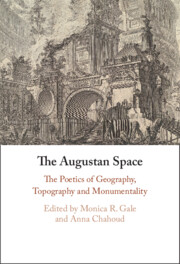Book contents
- The Augustan Space
- The Augustan Space
- Copyright page
- Contents
- Notes on Contributors
- Preface
- Abbreviations
- Introduction
- Chapter 1 The City in Horace’s sermo
- Chapter 2 excucurristi a Neapoli
- Chapter 3 Poetic and Imperial Spaces in Propertius, Books 1–3
- Chapter 4 Horace on Sacred Space
- Chapter 5 Roman Topography, Politics and Gender
- Chapter 6 aurea nunc, olim siluestribus horrida dumis
- Chapter 7 Hippolytus and Egeria in the Woods of Aricia (Virgil, Aen. 7.761–82 and Ovid, Met. 15.479–551)
- Chapter 8 locum tua tempora poscunt
- Chapter 9 imperii Roma deumque locus
- Chapter 10 The Rise and Fall of Virgil’s Sublime Carthage
- Chapter 11 Eccentric Poetry
- Chapter 12 Virgilian Heterotopias
- Chapter 13 loci desperati
- Works Cited
- Index Locorum
- General Index
Chapter 13 - loci desperati
Possibilities and Boundaries of Augustan Conceptions of Space
Published online by Cambridge University Press: 14 June 2024
- The Augustan Space
- The Augustan Space
- Copyright page
- Contents
- Notes on Contributors
- Preface
- Abbreviations
- Introduction
- Chapter 1 The City in Horace’s sermo
- Chapter 2 excucurristi a Neapoli
- Chapter 3 Poetic and Imperial Spaces in Propertius, Books 1–3
- Chapter 4 Horace on Sacred Space
- Chapter 5 Roman Topography, Politics and Gender
- Chapter 6 aurea nunc, olim siluestribus horrida dumis
- Chapter 7 Hippolytus and Egeria in the Woods of Aricia (Virgil, Aen. 7.761–82 and Ovid, Met. 15.479–551)
- Chapter 8 locum tua tempora poscunt
- Chapter 9 imperii Roma deumque locus
- Chapter 10 The Rise and Fall of Virgil’s Sublime Carthage
- Chapter 11 Eccentric Poetry
- Chapter 12 Virgilian Heterotopias
- Chapter 13 loci desperati
- Works Cited
- Index Locorum
- General Index
Summary
A locus desperatus is, in text-critical terminology, a passage which we deem irremediably corrupt. In these instances, we use cruces and keep hoping for a salvific stroke of genius. It is one of the paradoxes of the Roman Empire that, along with its borders, it kept shifting the criteria for their perception. To the more sensitive minds of the age, the expansionary drive of the Romans opened up many a locus desperatus, where hitherto the simple formats of order, coherence and accessibility obtained. The Augustans do not simply mend the sore spots on the imperial map that have become illegible. Rather, they point to them and, at times, even indicate the way that this drive into vague infinity could be steered: through concentration and the creation of spaces which, in their concrete and sensual materiality, seem to counteract the vacuous phrases of a propagandist territorial politics. If we believe Suetonius, one man cannot be blamed for the vacuity of such an ideology: Augustus himself. Not only does he prove to be a careful reader and interpreter of his own destiny, intent on every single letter; in his last days, we also see him operating according to the improvised rules of a topopoetics whose phantasmagorical productivity is adumbrated in the famous deathbed words: ‘Life: a mime!’ This begs the question: how Augustus-like were the Augustans, and how Augustan was Augustus?
- Type
- Chapter
- Information
- The Augustan SpaceThe Poetics of Geography, Topography and Monumentality, pp. 216 - 228Publisher: Cambridge University PressPrint publication year: 2024

